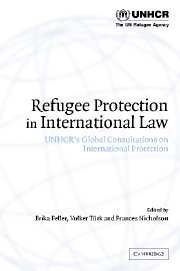Book contents
- Frontmatter
- Contents
- List of annexes
- Notes on contributors and editors
- Foreword
- Preface
- Acknowledgments
- Expert roundtables and topics under the ‘second track’ of the Global Consultations
- Table of cases
- Table of treaties and other international instruments
- List of abbreviations
- Part 1 Introduction
- Part 2 Non-refoulement (Article 33 of the 1951 Convention)
- Part 3 Illegal entry (Article 31)
- Part 4 Membership of a particular social group (Article 1A(2))
- Part 5 Gender-related persecution (Article 1A(2))
- Part 6 Internal protection/relocation/flight alternative
- Part 7 Exclusion (Article 1F)
- Part 8 Cessation (Article 1C)
- Part 9 Family unity (Final Act, 1951 UN Conference)
- 9.1 Family unity and refugee protection
- 9.2 Summary Conclusions: family unity, expert roundtable, Geneva, November 2001
- 9.3 List of participants
- Part 10 Supervisory responsibility (Article 35)
- Index
9.2 - Summary Conclusions: family unity, expert roundtable, Geneva, November 2001
Published online by Cambridge University Press: 28 August 2009
- Frontmatter
- Contents
- List of annexes
- Notes on contributors and editors
- Foreword
- Preface
- Acknowledgments
- Expert roundtables and topics under the ‘second track’ of the Global Consultations
- Table of cases
- Table of treaties and other international instruments
- List of abbreviations
- Part 1 Introduction
- Part 2 Non-refoulement (Article 33 of the 1951 Convention)
- Part 3 Illegal entry (Article 31)
- Part 4 Membership of a particular social group (Article 1A(2))
- Part 5 Gender-related persecution (Article 1A(2))
- Part 6 Internal protection/relocation/flight alternative
- Part 7 Exclusion (Article 1F)
- Part 8 Cessation (Article 1C)
- Part 9 Family unity (Final Act, 1951 UN Conference)
- 9.1 Family unity and refugee protection
- 9.2 Summary Conclusions: family unity, expert roundtable, Geneva, November 2001
- 9.3 List of participants
- Part 10 Supervisory responsibility (Article 35)
- Index
Summary
The second day of the Geneva Expert Roundtable addressed the issue of family unity, based on a discussion paper by Kate Jastram and Kathleen Newland, entitled ‘Family Unity and Refugee Protection’. Participants were also provided with written contributions from Judge Katelijne Declerk of the Belgian Permanent Appeals Tribunal for Refugees, Ninette Kelley, a Canadian legal practitioner, Dr Savitri Taylor, La Trobe University, Victoria, Australia, and the Refugee Immigration and Legal Centre, Melbourne, Australia. Participants included twenty-eight experts from eighteen countries, drawn from governments, NGOs, academics, the judiciary, and the legal profession. Professor Vitit Muntarbhorn, from Chulalongkorn University, Thailand, moderated the discussion.
The following summary conclusions do not necessarily represent the individual views of participants or of UNHCR, but reflect broadly the understandings emerging from the discussion.
General considerations
A right to family unity is inherent in the universal recognition of the family as the fundamental group unit of society, which is entitled to protection and assistance. This right is entrenched in universal and regional human rights instruments and international humanitarian law, and it applies to all human beings, regardless of their status. It therefore also applies in the refugee context. A small minority of participants, while recognizing the importance of the family, did not refer to family unity as a right but as a principle.
[…]
- Type
- Chapter
- Information
- Refugee Protection in International LawUNHCR's Global Consultations on International Protection, pp. 604 - 608Publisher: Cambridge University PressPrint publication year: 2003
- 1
- Cited by



